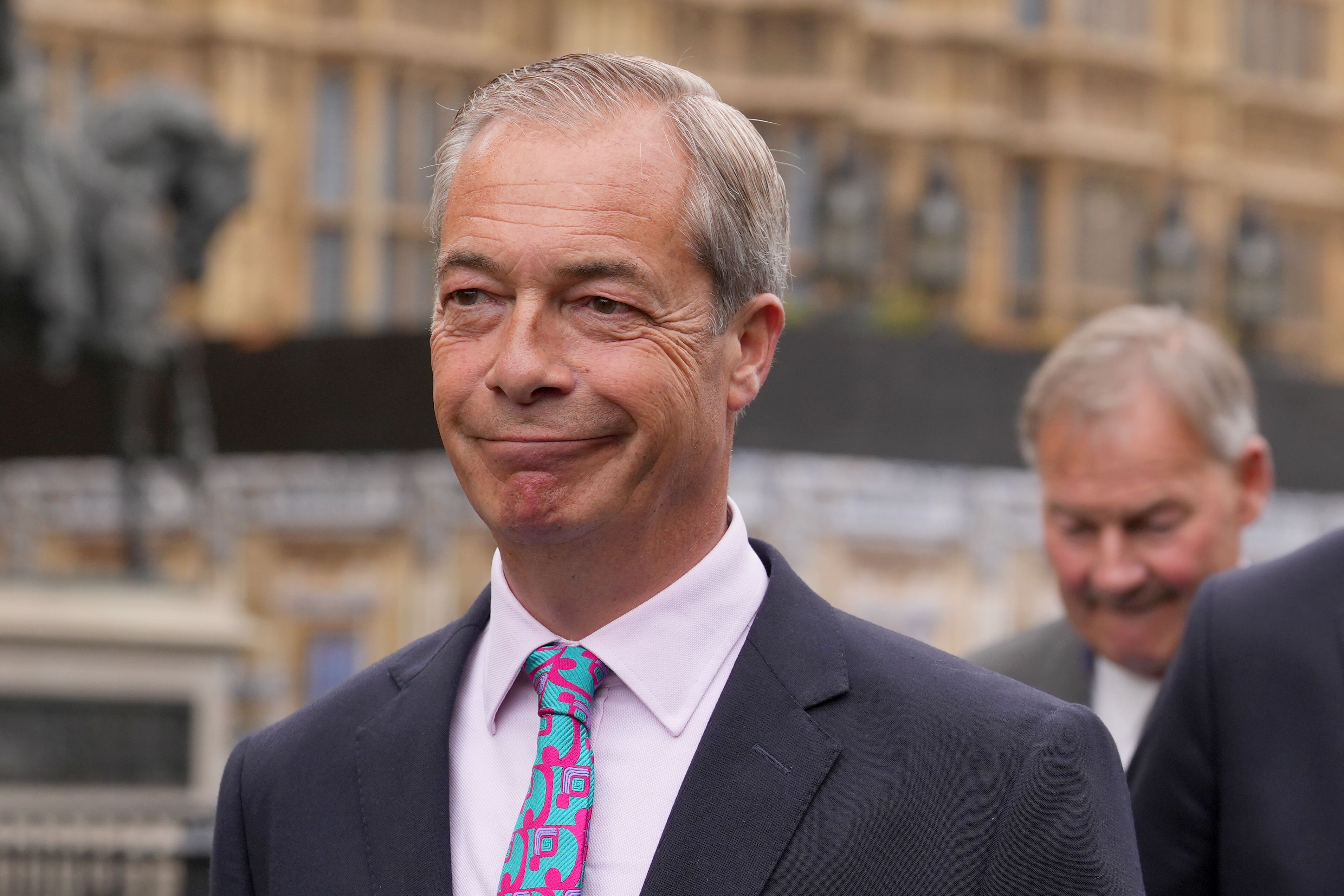The Reform Party: Delivering On Its Promises? An Analysis Of Farage's Leadership

Table of Contents
Key Promises of the Reform Party
The Reform Party's platform, heavily influenced by Nigel Farage's vision, centers on several core tenets. These promises, often articulated during election campaigns, resonated with a specific segment of the electorate disillusioned with mainstream politics. Understanding the context surrounding these promises is crucial to evaluating their fulfillment.
-
Complete withdrawal from the EU: This was a cornerstone of the Reform Party's platform, appealing to those who felt the UK's membership in the European Union was detrimental to national sovereignty and economic interests. The promise tapped into deep-seated anxieties about loss of control and immigration.
-
Control of national borders: Tied closely to Brexit, this promise focused on stricter immigration controls, promising to reduce immigration levels and strengthen border security. This resonated with voters concerned about the impact of immigration on public services and national identity.
-
Reduction of immigration: This specific policy aimed to limit both legal and illegal immigration, a key aspect of the party's broader anti-EU stance and commitment to national sovereignty. This promise appealed to those who believed that high levels of immigration negatively impacted the UK.
-
Economic policy focused on deregulation and lower taxes: The Reform Party advocated for policies aimed at reducing the regulatory burden on businesses and lowering taxes to stimulate economic growth. This aspect of the party's platform attracted those who felt burdened by regulations and high taxation.
Electoral Performance and Public Opinion
Analyzing the Reform Party's electoral performance and public perception is crucial to assessing its success in translating promises into political reality.
Local and National Election Results
The Reform Party's electoral success has been mixed. While it has achieved significant gains in local elections in certain regions, securing council seats and increasing its vote share, its performance in national elections has been less impressive. The party’s vote share in the 2019 general election, for example, while considerable in some areas, did not translate into a large number of parliamentary seats. Detailed analysis of specific election results and voter turnout figures would be required for a comprehensive assessment. Keyword searches for "Reform Party election results 2023" and similar terms would yield relevant data.
Public Opinion Polls and Surveys
Public opinion polls consistently show fluctuating levels of support for the Reform Party and Nigel Farage. Initial surges in popularity following Brexit have been followed by periods of decline. Analysis of polling data reveals a complex picture, with support concentrated in specific demographics and regions, while others remain skeptical. Understanding these shifts in public perception—influenced by factors such as policy announcements, media coverage, and leadership style—is key to understanding the party's overall trajectory. Key search terms for researchers would include "Reform Party public opinion polls," "Nigel Farage popularity ratings," and "voter sentiment towards the Reform Party."
- Increased support among older voters.
- Lower support among younger demographics.
- Regional variations in support levels.
Policy Implementation and Impact
Evaluating the Reform Party's impact requires examining the extent to which its policy goals have been achieved.
Successful Policy Implementations (if any)
Given the Reform Party's limited parliamentary representation, its direct influence on policy implementation has been minimal. However, the party's success lies in its ability to shape the political debate and exert pressure on mainstream parties to adopt certain positions. The party’s impact on the national conversation regarding Brexit and immigration control should not be underestimated, even if it hasn’t directly implemented its policies.
Failed or Unfulfilled Promises
Many of the Reform Party’s promises remain unfulfilled. The party’s lack of a majority in parliament presents a significant obstacle to enacting sweeping changes in immigration policy and economic regulation. Moreover, the complex political landscape and opposition from other parties have hindered the party's ability to translate its ambitions into reality. A thorough examination of the specific reasons for these failures – encompassing legislative hurdles, political gridlock, and shifting political priorities – would provide a more complete picture.
- Lack of parliamentary majority.
- Resistance from other political parties.
- Unforeseen economic and global events.
Leadership and Party Structure under Nigel Farage
Nigel Farage's leadership style has been a defining feature of the Reform Party.
Farage's Leadership Style
Farage's leadership style is often described as populist, charismatic, and directly confrontational. His use of strong rhetoric and focus on anti-establishment sentiment have resonated with a specific segment of the electorate. This approach has both strengthened the party's appeal to its core base and alienated potential supporters. Analyzing the impact of this style on party cohesion and long-term viability is crucial. Keywords like "populist leadership," "charismatic authority," and "political communication strategies" are relevant here.
Internal Party Dynamics
While Farage's strong leadership has provided a unifying figure for the party, accounts suggest internal conflicts and power struggles. Maintaining party unity amid diverse viewpoints and internal ambitions presents an ongoing challenge for the Reform Party. The internal dynamics, or lack thereof, significantly impact its effectiveness and ability to present a united front. Exploring internal party politics is crucial for understanding the Reform Party’s long-term trajectory.
- Centralized decision-making under Farage.
- Potential for internal dissent and factionalism.
- Challenges in balancing ideological purity with broader appeal.
Conclusion
In conclusion, the Reform Party's success in delivering on its promises has been limited, largely due to its lack of parliamentary power and the complex political landscape of the UK. While the party has had a significant impact on the political discourse surrounding Brexit, immigration, and economic policy, its ability to translate its ambitions into concrete policy changes remains hampered. Nigel Farage's leadership, characterized by its populist and confrontational style, has been both a strength and a weakness, consolidating support within the party’s base while alienating potential supporters. The future of the Reform Party remains uncertain, dependent on its ability to navigate internal divisions, adapt to changing political circumstances, and effectively communicate its vision to a broader electorate.
Do you think the Reform Party is fulfilling its promises? Share your thoughts in the comments below!

Featured Posts
-
 Increased Bitcoin Mining Exploring The Factors Driving The Rise
May 09, 2025
Increased Bitcoin Mining Exploring The Factors Driving The Rise
May 09, 2025 -
 Netflix Predstoyasch Rimeyk Na Kniga Ot Stivn King
May 09, 2025
Netflix Predstoyasch Rimeyk Na Kniga Ot Stivn King
May 09, 2025 -
 Mild Vinter Forer Til Tidlig Stenging Av Skisentre
May 09, 2025
Mild Vinter Forer Til Tidlig Stenging Av Skisentre
May 09, 2025 -
 Bitcoin Madenciligi Karliligini Kaybediyor Neden Ve Ne Yapmali
May 09, 2025
Bitcoin Madenciligi Karliligini Kaybediyor Neden Ve Ne Yapmali
May 09, 2025 -
 Arsenal Vs Psg Champions League Final Hargreaves Expert Prediction
May 09, 2025
Arsenal Vs Psg Champions League Final Hargreaves Expert Prediction
May 09, 2025
Latest Posts
-
 Has Chris Martins Influence Shaped Dakota Johnsons On Screen Persona
May 09, 2025
Has Chris Martins Influence Shaped Dakota Johnsons On Screen Persona
May 09, 2025 -
 Dakota Johnsons Career Path The Chris Martin Factor
May 09, 2025
Dakota Johnsons Career Path The Chris Martin Factor
May 09, 2025 -
 Is Chris Martin Influencing Dakota Johnsons Acting Roles
May 09, 2025
Is Chris Martin Influencing Dakota Johnsons Acting Roles
May 09, 2025 -
 Dakota Johnson And Chris Martin A Look At Her Career Choices
May 09, 2025
Dakota Johnson And Chris Martin A Look At Her Career Choices
May 09, 2025 -
 Market Volatility In Pakistan Stock Exchange Portal Experiences Outage
May 09, 2025
Market Volatility In Pakistan Stock Exchange Portal Experiences Outage
May 09, 2025
